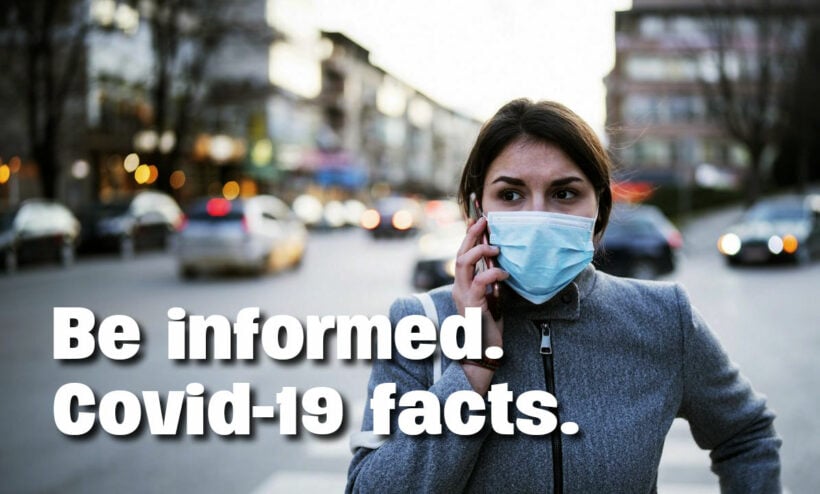Be informed, be aware. Prevention and precautions in a Covid-19 world.

As of this morning the number of cases of the Covid-19 coronavirus has reached 169,552. The number of deaths related to the virus is now 6,516, representing a death rate of around 3.8%, up from 3.4% two weeks ago, and up from the earlier days when it hovered around 2%. But the number of people that have fully recovered has now grown to 77,753.
Thailand reported 32 new cases yesterday. Read about the new cases HERE.
In the last week the spikes have been in Italy, USA, Iran, Spain, Germany and other European countries. More outbreaks will occur. As the number of cases mount and treatment is becoming more nuanced with a larger sample size, across the globe, some key factors are emerging.
Firstly, the virus is statistically more contagious than the flu or common cold, whilst the death rate is higher than seasonal flus. A lot higher. Like 60-80 times higher (when compared to annual US influenza statistics). Statistically that isn’t hugely significant when there are 100,000 cases. But it would be if there were 100 million, or a billion cases.

Covid-19 also has a higher potential to overwhelm health care systems with the sudden influx of new cases and be a high risk for people with other illnesses.
Influenzas and the common cold are already global and have been floating around the global community for thousands of years, mutating and evolving. Covid-19 has been around for just over 2 months, and only a month or so beyond China’s borders (in any significant numbers).
For example, just two weeks ago Italians were going about their daily lives with a few isolated cases being reported in the north of the country. Now the entire country is in complete lockdown and their hospital system overwhelmed with cases. 17,660 confirmed cases as of today and a death rate of 7.1%.
Still, the ability for governments, generally, to contain the spread of the disease has been swift at this stage and the education about prevention continues spread quickly through the internet (as does the misinformation).
It should also be noted that many of the people who have sadly succumbed to the virus have been in the older demographics, in China and beyond, and many with reported underlying diseases as well. In fact, as you get older your chances of dying from a Covid-19 infection increases, in a completely predictable linear fashion. The message here is clear – be young and remain healthy.

Secondly, the virus’s incubation period, where it can remain contagious with the carrier showing few or no symptoms, is an ongoing concern. Biologically, it behaves differently than the flu.
Viruses are genetically destined to survive, evolve and thrive. The insidious beauty of the Covid-19 virus is that the symptoms in its human hosts can remain dormant for up to 4 days (current estimates), during which time the host can be highly contagious, milling around in close contact with other humans, oblivious to their role as a ‘spreader’.
This relatively unique dynamic of the Covid-19 coronavirus will continue to remain the disease’s main advantage, and the biggest challenge for world health authorities.

Thirdly, we are still in the very early phases of this pandemic. Whilst the containment has been swift in most cases, and with many locations in almost total lockdown (parts of central South Korea, Italy, some New York suburbs) we’re still seeing a wide spread of the virus.
It’s also clear that our mobile, gregarious and jet-setting lifestyle – more people are flying from continent to continent than any time in human history – is a perfect mechanism to spread the disease, faster and more efficiently.
In the last week we’ve seen a serious escalation of cases in disparate locations around the world, most Europe and the US at this stage. But be assured that these ‘outbreaks’ will pop up in other locations in the coming weeks and months. Consider that places like India, South America and Africa are still to report large outbreaks at this stage. That could currently be due to inadequate testing or mis-reporting.

Finally, whilst we’ve learned a lot as we follow and analyse cases in the digital age, there’s still much we don’t understand about this novel coronavirus. As its original designation suggests, it’s novel, or new. New information, scientifically verified, is creeping out each day giving global authorities better information to initiate better procedures to try and contain the spread and care for patients.
That all bodes well for the future although, at this stage, the increased knowledge hasn’t turned into a drop in the numbers of new reported cases. Responsible media remains core to communicating the latest, most accurate information.
The best we can all do is be prepared, informed and keep up to date with reliable news on the matter.
So, why should we be taking the Covid-19 outbreak seriously?
In the next few months there will surely be some reliable, proven vaccine produced. But it could take up to a year, or more, to test and then ramp up the manufacture to a point where medical authorities could usefully start vaccinating large sections of the community. Even so, the early days of manufacture will be used on the most serious cases, in the richest countries. It’s roll-out to a wider world population could take many more months.
The best long term solution is going to remain preventative which will fundamentally change so many aspects of our lives, compared to the pre-coronavirus days (pre-2020).
Travel, events, gatherings of people, greetings, wearing of face-masks (whether they provide any barrier or not), tourism industries, airlines, business sentiment, etc, etc.
Even this week we’ve seen a substantial reaction from the business world with share markets dropping around the world. We’re likely to see more knee-jerk investor reaction as the business world fully digests the impact of the virus spread. At this stage the effects to business will probably be profound and medium to long-term, maybe up to the end of this year. But no one really knows.
Many things will change and a new post-Covid-19 world may emerge, where our community and contact with each other may be played out in a whole new way; the hand shake, the cheek-kiss greeting of the Europeans, protocols at large events, the idea of centralised ‘offices’ – we’re already starting to see habits modified to cope with the new paradigm.
New general behaviours will emerge which will profoundly change the way we communicate and go about civil discourse.
The big winners will be some medical companies and private hospitals, home delivery services, businesses that can operate with its workforce working remotely, and probably a few churches (for those that prefer a ‘divine’ solution rather than a medical one). There will also be a boom in fake-cures, pseudoscience-related information, scams and politicians who will use the turn of events to their own benefit. Turn your bullshit-detector dial up to ‘high’.

So when people post about world influenza figures, compare the Covid-19 outbreak to the issue of global starvation or even the road toll, they forget that ALL these issues are separate and unique situations that bear no resemblance. The issues should not, and cannot, be compared. We are in the very early phases of Covid-19 and we already know enough to confirm that this in NOT just another influenza with an extremely low mortality rate.
We remain floundering in the early days of this world pandemic and, statistically, there are no positive signs of the situation being brought under control in the immediate future.
“We are in unchartered territory. We have never before seen a respiratory pathogen that is capable of community transmission, but which can also be contained with the right measures.” – WHO Chief
Remain alert and informed, but not alarmed.
Symptoms
Symptoms of Covid-19 are similar to a range of other illnesses such as influenza. Having any of these symptoms does not necessarily mean that you have Covid-19, and in the vast majority of cases, it won’t be. But symptoms include…
- fever
- coughing
- difficulty breathing
Difficulty breathing is a sign of possible respiratory problems, a lung infection or pneumonia and requires immediate medical attention.
We don’t yet know how long symptoms take to show after a person has been infected, but current World Health Organisation assessments suggest that it is 2–10 days, even up to 14 days.
If you have these symptoms, or have recently been to a country or area of concern, or have been in close contact with someone confirmed with Covid-19, or in an area with a lot of other people, please contact your nearest public hospital to register your situation, and go to the hospital if you start to display symptoms.
Prevention
There is currently no vaccine to prevent the latest coronavirus (Covid-19). The best way to prevent illness is to avoid being exposed to the virus in the first place. However, here are some everyday preventive actions to help prevent the spread of respiratory diseases, including…
- Avoid close contact with people who are sick (probably good advice at any time).
- Put distance between yourself and other people if Covid-19 is spreading in your community. This is especially important for people who are at higher risk of getting sick.
- Avoid touching your eyes, nose, and mouth. Maintain high standards of hygiene.
- Stay home if you are sick and inform your family or workplace if you are unwell.
- Cover your cough or sneeze with a tissue, then throw the tissue in the rubbish bin.
- Clean and disinfect frequently touched objects and surfaces using a regular household cleaning spray or wipe. This includes tables, doorknobs, light switches, countertops, handles, desks, keyboards, toilets, faucets, and sinks.
- Follow medical recommendations for using a face mask…
- The US Centres for Disease Control and the World Health Organisation do not recommend that people who are well wear a face mask to protect themselves from respiratory diseases, including Covid-19.
- Face masks should be used by people who show symptoms of Covid-19 to help prevent the spread of the disease to others. The use of face masks is also crucial for health workers and people who are taking care of someone in close settings (at home or in a health care facility)
- Face masks may be in short supply and they should be saved for caregivers.
- Note: The flimsy, cheap, paper face masks will do almost nothing to help anyone.
- Wash your hands often with soap and water for at least 20 seconds, especially after going to the bathroom, before eating, and after blowing your nose, coughing, or sneezing.
- As an alternative, use an alcohol-based hand sanitiser with at least 60% alcohol.
- Always wash hands with soap and water if hands are visibly dirty.
Latest Thailand News
Follow The Thaiger on Google News:


























